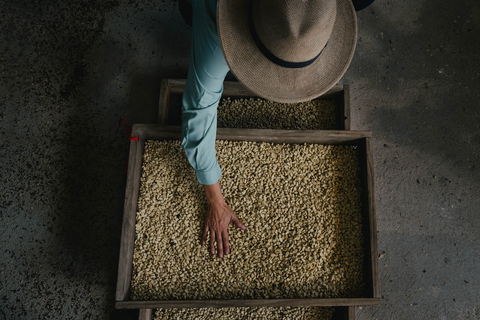Starbucks Expands Global Effort to Protect Future of Coffee with Two New Coffee Farms
In collaboration with coffee farmers around the world, Starbucks to scale solutions to ensure the future of coffee for all; adds two new coffee innovation farms located in
Investments build on Starbucks work with farmers to help increase productivity on farms, increase profitability for farmers and mitigate the impact of climate change on coffee.

Starbucks agronomist at Hacienda Alsacia (Photo: Business Wire)
“Starbucks works with more than 450,000 farms that grow the highest quality Arabica coffee in the world,” said Michelle Burns, Starbucks evp of Global Coffee and Sustainability. “Our promise to those farmers and their communities is that we will always work to ensure a sustainable future of coffee for all. Our solution is to develop on-farm interventions, share seeds, research and practices across the industry to help farmers mitigate the impacts of climate change.”
Starbucks buys three percent of the world’s coffee, sourcing and roasting only Arabica coffee beans, a variety known for its rich and complex flavors. Climate change is impacting the availability of high-quality coffee around the world and farming communities are feeling the impact on productivity, crop quality and their livelihoods. Rising temperatures that cause drought, coffee leaf rust disease and other related climate challenges are impacting the availability, quality and taste of coffee as it’s known today.
At Hacienda Alsacia, Starbucks is working to mitigate the impacts of climate change. The company has created best practices to make growing coffee more profitable; developed the next generation of disease-resistant, quality coffee; and shared it all with farmers around the world. For example, since making the commitment to distribute 100 million coffee trees by 2025, Starbucks has distributed approximately 90 million climate-resistant coffee trees and more than 53 million coffee seedlings to farmers. Additional coffee innovation farms will enable more research in new geographies to better mitigate the threat of climate change.
The new farms in
With future farm investments also planned for
Research on Starbucks innovation farms will be scaled through the company’s coffee innovation network, a multi-pronged approach to ensuring a sustainable future of coffee for all. In addition to innovation farms, the network includes 10 Farmer Support Centers in coffee-growing regions around the world, where world-class agronomists collaborate directly with farmers on research and best practices, and 70 “model farms” within Starbucks supply chain, where solutions are put into action. The network’s focus on learning and innovation will continue through the sustainability learning and innovation lab at Hacienda Alsacia, which will break ground in December.
“Through these innovation farms, we will develop solutions that will not only improve coffee productivity and quality but also empower farmers with the tools and knowledge needed to thrive in a changing world and challenging climate,” said Roberto Vega, Starbucks vice president of Global Coffee Agronomy, R&D and Sustainability. “This work is done on behalf of coffee farmers everywhere with findings that can be applied across other industries and crops that are also impacted by climate change.”
For more information about Starbucks sustainability initiatives and coffee sourcing practices, please visit https://stories.starbucks.com/.
View source version on businesswire.com: https://www.businesswire.com/news/home/20241003231789/en/
Starbucks Media Relations
press@starbucks.com
206-318-7100
Source: Starbucks Corporation









